| Reviews & Columns |
|
Reviews DVD TV on DVD Blu-ray 4K UHD International DVDs In Theaters Reviews by Studio Video Games Features Collector Series DVDs Easter Egg Database Interviews DVD Talk Radio Feature Articles Columns Anime Talk DVD Savant Horror DVDs The M.O.D. Squad Art House HD Talk Silent DVD
|
DVD Talk Forum |
|
|
| Resources |
|
DVD Price Search Customer Service #'s RCE Info Links |
|
Columns
|
|
|
That Girl - Season Three
Last year, I wrote a review of That Girl: Season Two that highly praised the show, but that also raised questions about the political significance - specifically, its role within the then-burgeoning feminist movement - read into the series today by its star, Marlo Thomas (please click here to read that review). Expecting emails that would essentially call me a pig, I was somewhat surprised to instead get a few emails from women readers who agreed with my position. Frankly, it put me a little off-balance (I guess I really expected some ticked-off readers). That Girl: Season Three ups the political and social commentary in its stories this 1968-1969 season - albeit in totally safe, ultimately innocuous, gentle, American 1960s TV network-proscribed ways - which some critics and historians may again see as signs of the series' importance in relation to the turbulent era in which it was produced. But honestly, any American TV viewer could find social and political stories of at least equal (and frequently greater) impact over on CBS's venerable western, Gunsmoke - a series frequently described by those who haven't seen it as staid, formulaic, and artistically and politically unimportant.
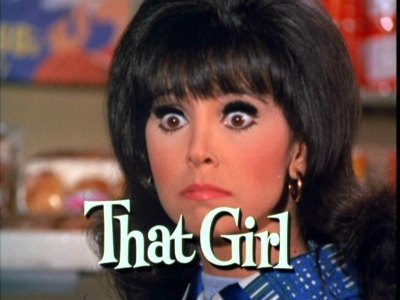
I always have a good time watching That Girl. It's a clever, bright, funny show with a lot of heart and an excellent cast, led by the incandescent Marlo Thomas. I just don't happen to think its groundbreaking premise (it did advance a portrait of a young, independent woman living "somewhat" on her own terms) was all that revolutionary in any real sense outside of getting television to move further along in modernizing its portrayals of female characters. As I discussed in my first review, America didn't just suddenly wake up and send its young women off to lead independent lives when the series first showed up on the airwaves; there were already millions of women out there who had already been doing that for a long time. TV sitcoms don't initiate major shifts in society; they may, however, reflect them.
With the third season of That Girl, it's obvious that politics are on the mind of the producers of the series, as well as the star, Marlo Thomas. Her character, Ann Marie, is a little more strident in asserting her independence from Donald. When the inevitable friction from their two different viewpoints surfaces (Donald wants to "take care of her," while Ann fights to take care of herself), Ann's reasoning is a tad more overtly political; quite a few dialogue passages sound like the speeches being made out on campuses and in the streets from that tumultuous time period of change in America. But the show is witty and wise enough (or would Thomas today say the networks demanded compromise?) to always temper Ann's enthusiasm with humor.Donald, the steadying rock in bubbly Ann's life, is sweet and understanding when Ann's views lead her off on a tangent, but he's not shy about pointing out how Ann's actions frequently backfire. There's a quite interesting episode, The Defiant One, where Ann protects a little African-American boy who shoplifts at her local store. The young child tries to tell Ann he lives in a Park Avenue penthouse, but, seeing that Ann obviously doesn't believe him, goes on a fantasy-spinning tale of tenement houses teeming with rats, and overcrowding from 13 brothers and sisters. Only when the boy's father shows up at Ann's, and confirms the little boy is indeed quite wealthy, does Ann see her mistake. Now, at this point, the episode seems on the verge of being quite illuminating - and fair - for exposing biases and prejudices that liberals possess, as well. Donald points out Ann's mistake, and she realizes she's been had by her own liberal biases towards stereotypes. However, the show ends on a note of blaming society in general, not those patronizing biases, for Ann's mistake. It's clear that That Girl wants to address social ills in this season, and that a certain uneasy balance and fairness is trying to come through in the scripts, but fashionable Hollywood liberal leanings still win out in the end.
Other overtly "topical" episodes bear those leanings out, as well. Secret Ballot, where Ann bones up on the Congressional Record to be prepared to vote in her first Presidential election, mirrors a situation no doubt occurring at the time in millions of American households: the notion of voting "the party ticket," with young people breaking away from the tradition of voting the way their parents voted. While Donald - always the peacemaker - tries to get Ann to understand her father's point of view (he demands to know what party affiliation his daughter has declared), he also points out that she's being overly strident and obstinate about a subject that she knows will upset her father. And while Donald's balanced voice is welcome, as always, the episode tilts blame towards the father (and, not surprisingly, intimates in this and other episodes that he's a staunch conservative).
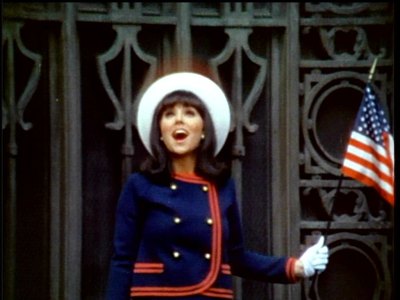
It's important to remember, however, that despite the occasional sincere attempts by the production staff to keep the series on the pulse of the times, That Girl: Season Three is still largely homogenized and "network safe" for 1967-1968. The DVD box claims that among other social ills That Girl faces this season, spousal abuse is also addressed. But to call Eleven Angry Men and That Girl - a tame spoof of 12 Angry Men that shows a guy backhanding his wife in a strictly comical (and hence, weird) fashion - in any way controversial, is to really stretch a point. Ann Marie still engages in typically wacky, Lucille Ball-inspired physical comedy gags, such as getting stuck in a roll-away bed, or screaming and jumping on a couch when she sees a mouse, or getting stuck up in a tree. Much of That Girl still plays like a conventional sitcom, and does so most professionally and engagingly. However, That Girl is admirable in that it never "cheats" by dreaming up these physical gags or overtly comedic situations out of whole cloth; the humor always stems from within the characters' actions and the situation (except, possibly, for the misguided slapstick episode The Homewrecker and the Window Washer, which has Jules Munshin out on a ledge for no apparent reason, while Ann thrashes about ineffectually).
And as always with That Girl, the main thrust of story conflict comes from Donald and Ann's rather strange sitcom relationship. In this third season, Donald has been toned down considerably in his insistence on marrying Ann; apparently, by now, they've come to an uneasy agreement on being a couple - but that's all. As for the sex, well, apparently they're still not having any, considering all the times that it appears they will, only to be stopped by both parties when they realize "it wouldn't be right." Watching these scenes today, it's amazing how chaste and celibate the entire relationship is; the writers, to their credit, are quite ingenious in keeping the two out of bed. Although, in an episode like 7 1/4 where Donald puts Anne to bed and kisses her goodnight, the writers have no recourse but to just have him walk out of her hotel room because she's "too tired," when any normal adult couple who had been together so long, wouldn't have parted at that moment.
And quite a few episodes still revolve around the rather ridiculous (by this point in the three season-long series) conceit of Ann's father constantly trying to make sure she stays a virgin. With Lew Parker (in a performance that always puts me on edge; it's never as comical as it is grumpy and somewhat joyless) seemingly arriving at Ann's at any hour of the day or night, just when Donald happens to be in an innocent, but compromising position with Ann, the strain of that network-prescribed safety valve for the censors is really starting to show wear and tear at this point. Still, that's only a minor quibble, because most of That Girl: Season Three is still smartly put together (the production is first-rate), with ample funny lines and the winning Marlo Thomas keeping our attention.
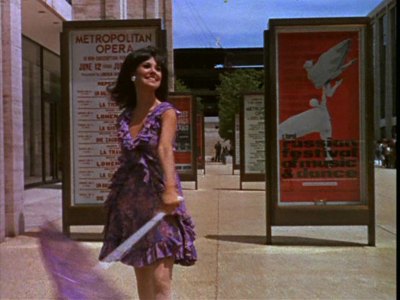
DISC ONE
Sock It To Me
Ann is up for a part in the Broadway play, The Revolutionary Heart with star Barry Sullivan, but there's one small hitch: she can't bring herself to slap him across the face.
The Hi-Jack and the Mighty
Ann poses as an airline hostess to get background on an upcoming job, but she soon causes havoc on the plane when she suspects there's a Cuban hijacker on board. Good line from Donald to Ann: "If there's anything Castro deserves, it's your father."
Eleven Angry Men and That Girl
Ann is the only holdout in a jury deliberating a wife-beating case. David Ketchum and Joe Besser are here in this one, and Stuart Margolin does a funny bit as a hippie artist ticked off at the world.
7 1/4 (Part 1)
Donald goes to L.A. to do a story on violence in movies and TV, while Ann tags along, playing musical bedrooms with Donald. Buddy Lester has a moment as a hotel houseman, and Donald gets to declare, "Ann certainly knows all there is to know about sex."
7 1/4 (Part 2)
As Donald researches his violence in the movies and TV story, Ann finds herself the star of some rather violent TV commercials for Action soda pop. Some nice shots of Paramount Studios, and Jesse White and Frank DeVol are on hand. Ann gets to say, "If you want some action, just open the door."
Secret Ballot
Ann's first presidential election is cause for some serious studying -- as well as a serious argument with her father, who demands to know how's she's going to vote. Ann's best line: "Well, what about my money, my identification, my eye shadow? Donald, I can't exist without my purse!"
DISC TWO
The Face in the Shower Room Door
Ann meets her dreamy next-door-neighbor when he unlocks her shower door -- when she's stuck in it. Cesare Danova guest stars.
A Muggy Day in Central Park
Ann is mugged, and Donald dresses in drag to go along with the cops patrolling Central Park. Ann's best line: "I never heard of an actress yet who got a decent part because she was mugged. Noam Pitlik and Dick Wesson are on board here.
Just Donald and Me and Jerry Makes Three
Jerry and Ruth have a fight, and Donald and Ann get in the middle of things, trying to patch them back up. Bernie Kopell shows up. Ann's best line? "Donald, I have a woman's intuition. You're dealing strictly from logic and common sense."
The Seventh Time Around
Donald's firecracker-of-a-publisher has her sights on making him her seventh husband. Donald gets to say, "First I'm a lousy shaver; now I can't even tie a tie. I wonder if I should start questioning my masculinity?" The marvelous Benay Venuta guest stars.
Ann vs. Secretary
Donald's sexy, efficient new secretary makes no bones to Ann that she's after Donald. Ann confusingly details her relationship with Donald: "We're not married or engaged together. Because we want it that way."
Decision Before Dawn
Ann gets an unexpectedly high residual check, and can't decide how best to spend it. Larry Storch gets to say, "People spend a third of their lives in bed. Some less, some...more." Vic Tayback is also seen.
Should All Our Old Acquaintances Be Forgot
There's nowhere to go on New Year's Eve, so Donald and Ann decide to stay at home -- until Ann's father puts a stop to that plan.
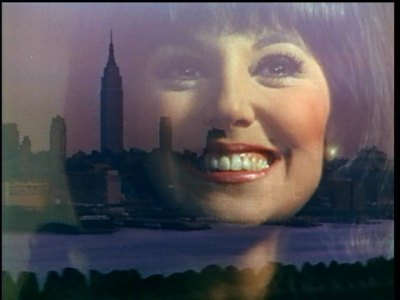
DISC THREE
The Homewrecker and the Window Washer
Ann befriends a henpecked window washer. Jules Munshin guests.
The Eye of the Beholder
Donald buys a questionable piece of art for Ann -- and Ann begins to question his motives.
Dark On Top of Everything Else
Ann spends a lonely weekend alone at her parent's house. Ann and Donald: "Who is it?" "Steve McQueen." "Oh, Steve! Come in and ravage me!"
The Earrings
Donald gives Ann some expensive diamond earrings -- and she promptly loses them. Best line by a disgusted flower delivery man: "Some guy blew 20 bucks on that girl."
Many Happy Returns
Ann owes the IRS $2,600, and it's up to Donald to bail her out. Ann gets to say, "I'm so scared! I don't want to go to jail! Those awful dresses and they make you cut your hair, I think! And how long can I ask you [Donald] to wait?"
My Sister's Keeper
Ann gets a gig as the Pop soda pop girl, but her lip-synching partner needs a confidence boost. The Thomas family guest stars here.
DISC FOUR
There Was a Time that Ann Met a Pie Man
Ann's new high-paying gig demands she get hit in the face with a pie -- and she's having none of it. Until they get Julie Andrews to do the part. The marvelous Jesse White shows up again.
The Subject Was Rabies
Ann's father is bit by a stray dog she brings home, and it's up to the neighborhood kids to find the pooch before rabies shots are administered.
The Defiant One
A little boy convinces Ann he comes from an underprivileged home -- but that's far from the truth.
Fly Me To the Moon
The Air Force wants Ann to be their poster girl for recruiting female astronauts. But Donald's apartment renovation is creating tension with the couple.
It's So Nice to Have a Mouse Around the House
There's a mouse in Ann's apartment, and Donald comes to the rescue.
Bad Day at Marvin Gardens
Donald and Ann's father get into a contentious Monopoly game over a rainy weekend in New York City.
Sue Me, Sue Me, What Can You Do To Me?
Donald loses his job when Ann's father slips and falls at his office, and the insurance company suspects collusion.
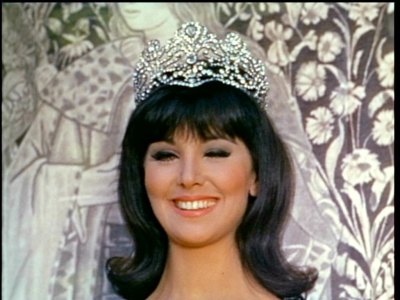
The DVD:
The Video:
Shot on 35mm film, That Girl: Season Three looks great in this full screen transfer. Colors are saturated, and only one or two scenes seem a bit faded. Normal, minor screen anomalies associated with 40-year-old series do occasionally pop up.
The Audio:
The Dolby Digital English mono sound mix accurately reflects the original broadcast presentation. It's sharp and clear.
The Extras:
There's a continuation of the featurette That Show...That Woman...The Creation of That Girl: The Woman on Both Sides of the Camera that appeared on Season Two, with Thomas again discussing the ramifications of the series on the pop culture scene. It gets a little sticky and generalized when she discusses gender politics again, but there's a good focus on the actual production of the series, and some fun stills. There are also commentaries for four episodes - The Face in the Shower Room Door, My Sister's Keeper, It's So Nice to Have a Mouse Around the House, and Bad Day at Marvin Gardens - that again feature Marlo Thomas and co-creator Bill Persky. And again, they're spotty at best (lots of silent passages), with solid, behind-the-scenes info sadly lacking. Particularly annoying (and frankly insulting) is the first commentary, where Thomas and Persky don't even know who co-star Cesare Danova is, until someone obviously slips them a note telling them his name. Most fans of vintage TV have no trouble identifying the charming, talented Danova, so a little prep work on the part of Thomas and Persky would have eliminated this embarrassing moment.
Final Thoughts:
Moving towards more political and social commentary, while still well-within the network prescribed limits for sitcoms in 1968, That Girl: Season Three strikes a sometimes uneasy balance between the two opposed intentions. Still, it's a funny, charming show, with well-written, sophisticated scripts, quick direction, and smart performances, particularly by super-sharp Marlo Thomas and easy-going Ted Bessell. I highly recommend That Girl: Season Three.
Paul Mavis is an internationally published film and television historian, a member of the Online Film Critics Society, and the author of The Espionage Filmography.


|
| Popular Reviews |
| Sponsored Links |
|
|
| Sponsored Links |
|
|
| Release List | Reviews | Shop | Newsletter | Forum | DVD Giveaways | Blu-Ray | Advertise |
|
Copyright 2024 DVDTalk.com All Rights Reserved. Legal Info, Privacy Policy, Terms of Use,
Manage Preferences,
Your Privacy Choices | |||||||













